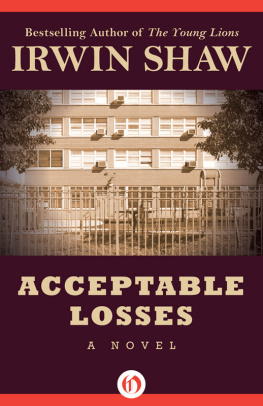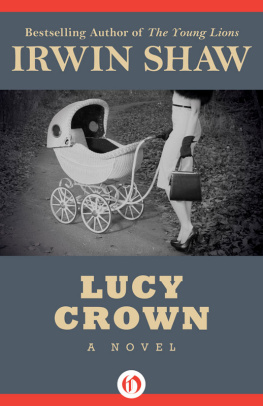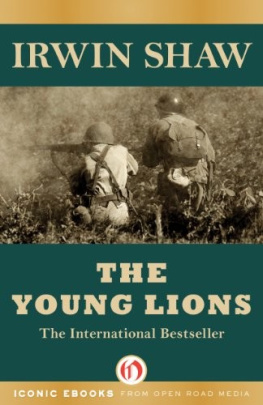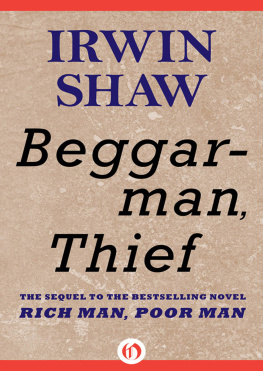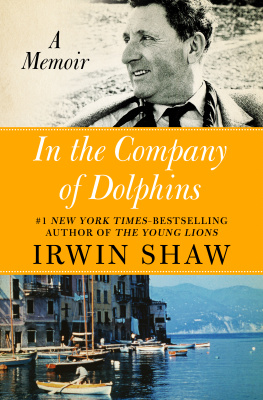Irwin Shaw - Voices of a Summer Day
Here you can read online Irwin Shaw - Voices of a Summer Day full text of the book (entire story) in english for free. Download pdf and epub, get meaning, cover and reviews about this ebook. year: 2013, publisher: Open Road Integrated Media, genre: Art. Description of the work, (preface) as well as reviews are available. Best literature library LitArk.com created for fans of good reading and offers a wide selection of genres:
Romance novel
Science fiction
Adventure
Detective
Science
History
Home and family
Prose
Art
Politics
Computer
Non-fiction
Religion
Business
Children
Humor
Choose a favorite category and find really read worthwhile books. Enjoy immersion in the world of imagination, feel the emotions of the characters or learn something new for yourself, make an fascinating discovery.
- Book:Voices of a Summer Day
- Author:
- Publisher:Open Road Integrated Media
- Genre:
- Year:2013
- Rating:4 / 5
- Favourites:Add to favourites
- Your mark:
- 80
- 1
- 2
- 3
- 4
- 5
Voices of a Summer Day: summary, description and annotation
We offer to read an annotation, description, summary or preface (depends on what the author of the book "Voices of a Summer Day" wrote himself). If you haven't found the necessary information about the book — write in the comments, we will try to find it.
Voices of a Summer Day — read online for free the complete book (whole text) full work
Below is the text of the book, divided by pages. System saving the place of the last page read, allows you to conveniently read the book "Voices of a Summer Day" online for free, without having to search again every time where you left off. Put a bookmark, and you can go to the page where you finished reading at any time.
Font size:
Interval:
Bookmark:


DEDICATION: To Betty Sicre
THE RED FLAG WAS UP when he drove up to the house. He went in. The house was silent. Peggy, he called. Peggy! There was no answer. His wife was not there nor either of his children.
He went out and looked at the ocean. The waves were ten feet high and there was about eight hundred yards of foam ripping between the tide line, marked by seaweed, and the whitecaps of the open Atlantic. The beach was deserted except for a tall girl in a black bathing suit, who was walking along the waters edge with two Siamese cats pacing beside her. The girl had long blond hair that hung down her back and blew in the wind. Her legs and arms were pollen-colored against the sea, and the cats made a small pale jungle at her ankles. The girl was too far away for him to tell whether she was pretty or not and she didnt look in his direction, but he wished he knew her. He wished he knew her well enough to call out and see her smile and wait for him to join her so that they could walk along the beach together, attended by toy tigers, the noise of the surf beating at them as she told him why a girl like that walked alone on an empty beach on a bright summer afternoon.
He watched her grow smaller and smaller in the distance, the cats, the color of the desert, almost disappearing against the sand. She was outlined for a last moment against the dazzle of the waves and then the beach was empty again.
It was no afternoon for swimming, and the girl was gone, and he didnt feel like hanging around the house alone so he went in and changed his clothes and got into the car and drove into town. On the high school field, there was a pickup game of baseball in progress, boys and young men and several elderly athletes who by Sunday morning would regret having slid into second base on Saturday afternoon.
He saw his son playing center field. He stopped the car and got out and lay back in the sun on the hot planks of the benches along the third-base line, a tall, easy-moving man with a powerful, graying head. He was dressed in slacks and a short-sleeved blue cotton shirt, the costume of a man consciously on holiday. On the long irregular face there were the not unexpected signs of drink and overwork. He was no longer young, and, although at a distance his slimness and way of moving gave a deceptive appearance of youth, close-up age was there, experience was there, above all around the eyes, which were deep black, almost without reflections, hooded by heavy lids and a dark line of thick lashes that suggested secret Mediterranean mourning against the olive tint of the skin stretched tight over jutting cheek bones. He greeted several of the players and spectators, and the impression of melancholy was erased momentarily by the good humor and open friendliness of his voice. The combination of voice and features was that of a man who might be resigned and often cynical, but rarely suspicious. He was a man who permitted himself to be cheated in small matters. Taxi drivers, employees, children, and women took advantage of him. He knew this, each time it happened, and promptly forgot it.
On the field, the batter was crouching and trying to work the pitcher for a walk. The batter was fifteen years old and small for his age. The pitcher was six feet three inches tall and had played for Columbia in 1947.
The third baseman, a boy of eighteen named Andy Roberts, called out, Do you want to take my place, Mr. Federov? I promised Id be home by four.
Thanks, no, Andy, Federov said. I batted .072 last season and Ive hung up my spikes.
The boy laughed. Maybe youd have a better season this year if you tried.
I doubt it, Federov said. Its very rare that your average goes up after fifty.
The batter got his walk, and while he was throwing his bat away and trotting down to first base Federov waved to his son out in center field. His son waved back. Andy, Federov said, hows Mike doing?
Good field, no hit, Andy said.
Runs in the family, said Federov. My father never hit a curve ball in his life either.
The next batter sent a line drive out toward right center, and Michael made a nice running catch over his shoulder and pivoted and threw hard and accurately to first base, making the runner scramble back hurriedly to get there before the throw. Michael was left-handed and moved with that peculiar grace that left-handers always seemed to Federov to have in all sports. There had never been a left-hander before in Federovs family, nor in his wifes family that he knew of, and Federov sometimes wondered at this genetic variance and took it as a mark of distinction, a puzzling designation, though whether for good or ill he could not say. Michaels sister, eleven years old and too smart for her age, as Federov sometimes told her, teased Michael about it. Sinister, sinister, she chanted when she disagreed with her brothers opinions, Old Pope Sinister the First.
Old Pope Sinister the First popped up to shortstop his next time at bat and then came over to sit beside his father. Hi, Dad. He touched his father lightly but affectionately on the shoulder. Howre things in the dirty city?
Dirty, Federov said. He and his brother ran a building and contracting business together, and while there was a lot of work unfinished on both their desks, the real reason the brothers had stayed in New York on a hot Saturday morning was to try to arrange a settlement with Louiss third wife, whom he wanted to divorce to marry a fourth wife, and who was all for a vengeful and scandalous action in court. Louis was the architect of the firm, and this connection with the arts, plus his quiet good looks, made him a prey for women and a permanent subsidy for the legal profession.
Wheres your mother? Federov asked his son. The house was empty when I got in.
Bridge, hairdressers, I dont know, Michael said carelessly. You knowdames. Shell turn up for dinner.
Im quite sure she will, Federov said.
Michaels side was retired, and he picked up his glove and started toward his position in the field. Mike, Federov said, you swung at a high ball, you know.
I know, Michael said. Im a confirmed sinner.
He was thirteen years old but, like his sister, was a ransacker of libraries and often sounded it.
Five minutes later there was a dispute about a close call at first base, and two or three boys shouted, good-naturedly, Oh, you bum! and Kill the umpire!
Stop that! Federov said sharply. Then he was as surprised as the boys themselves by the harshness of his tone. They kept quiet after that, although they eyed him curiously. Ostentatiously, Federov looked away from them. He had heard the cry thousands of times before, just as the boys had, and he didnt want to have to explain what was behind his sudden explosion of temper. Ever since the President had been shot, Federov, sometimes consciously, sometimes unconsciously, had refrained from using words like kill or murder or shoot or gun, and had skipped them, when he could, in the things he read, and moved away from conversations in which the words were likely to come up. He had heard about the mocking black-bordered advertisement in the Dallas newspaper that had greeted the President on his arrival in the city, and he had read about the minister who said that schoolchildren in the city had cheered upon being told of the Presidents death, and he had heard from a lineman friend of his on the New York Giants football team that, after the game they had played in Dallas ten days after the President was killed, an open car full of high school boys and girls had followed the Giants bus through downtown Dallas, chanting, Kennedy gawn, Johnson next, Kennedy gawn, Johnson next.
Next pageFont size:
Interval:
Bookmark:
Similar books «Voices of a Summer Day»
Look at similar books to Voices of a Summer Day. We have selected literature similar in name and meaning in the hope of providing readers with more options to find new, interesting, not yet read works.
Discussion, reviews of the book Voices of a Summer Day and just readers' own opinions. Leave your comments, write what you think about the work, its meaning or the main characters. Specify what exactly you liked and what you didn't like, and why you think so.


